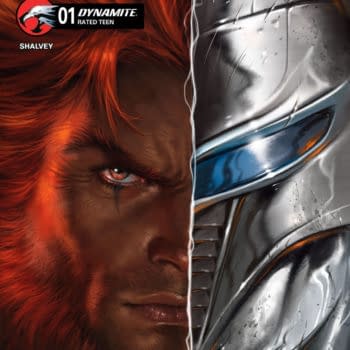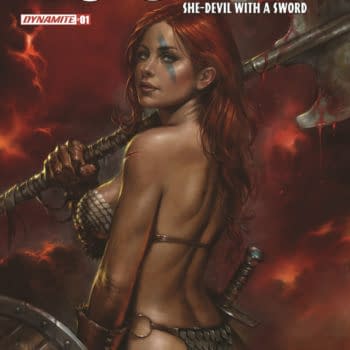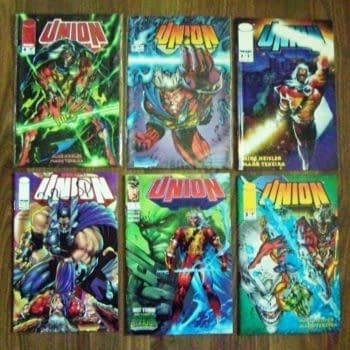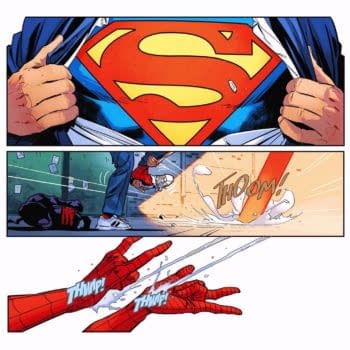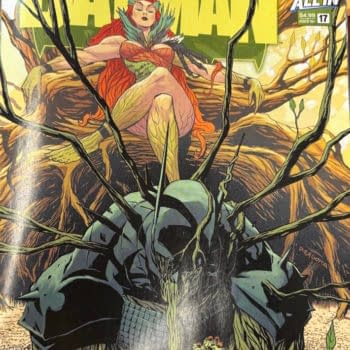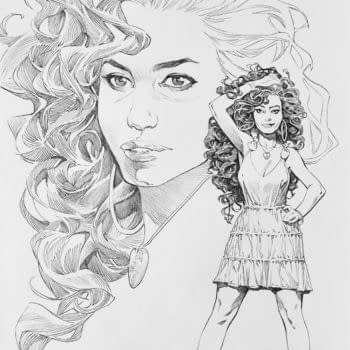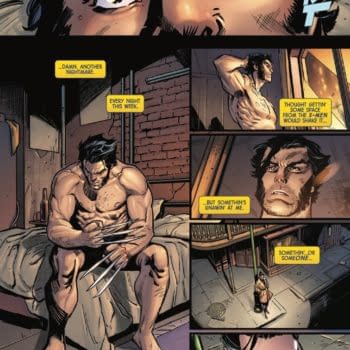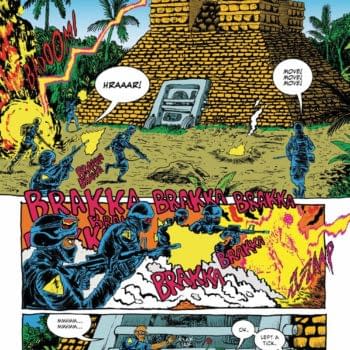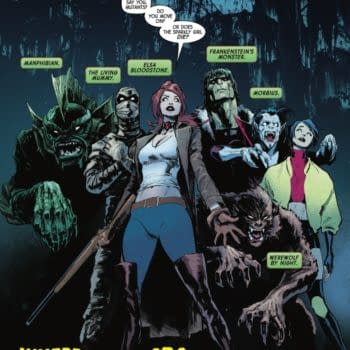Posted in: Comics | Tagged: boom, Comics, kyle higgins, shipping, wondercon
Explaining To Kyle Higgins What Shipping Means At The Boom Panel At WonderCon
![20160326_165940[1]](https://mlpnk72yciwc.i.optimole.com/cqhiHLc.IIZS~2ef73/w:600/h:1067/q:75/https://bleedingcool.com/wp-content/uploads/2016/03/20160326_1659401-e1459092026395.jpg)
So, Boom Studios doesn't do the average sort of comic publisher panel, where they show a slideshow with covers of upcoming books and announce creative teams. They have the internet for that. What they do is talk. Their panels get creators together to discuss their philosophies and thoughts about comics.
Filip Sablik introduces himself as the President of Marketing and Publishing for Boom Studios. Once again, I find myself part of the panel, as he jokes that the reason Boom doesn't just do the standard announcement panel is because I'd have the panels online in about 10 minutes.
More like 12 hours, but who's counting?
Our panelists today are:
The writing team of Collin Kelly and Jackson Lanzing, who have been working together on Hacktivist and Maze Runner, Batman and Robin Eternal and Grayson, as well as their current series Joyride. As Jackson enters the room, he finds that there is a rather unflattering picture of him used for his creator bio on display, as opposed to the proper one that Collin had.
Okay. Collin and Jackson are hilarious, they're also bordering on hivemind status from having worked together for so long. I will often just refer to something they said collectively, because keeping track of who said what proves to be rather difficult.
Next to join the stage is Hope Larson, the New York Times bestselling author who adapted A Wrinkle in Time into graphic novel format, as well having just been announced as the new writer of Batgirl.
Felipe Smith was next, the rare case of an American able to publish a comic in Japan, writer and artist of Peepo Choo, and created the All-New Ghost Rider Robbie Reyes for Marvel.
Kyle Higgins, writer of Mighty Morphin Power Rangers, Batman Eternal, Nightwing, the incredibly underrated C.O.W.L. was the second New York Times bestselling author to join the panel.
Sam Humphries, who went from self-publishing Our Love is Real, (which I continue to bring up at every panel he does in some form or another because well, WTF man) to writing tons of comics, like Uncanny X-Force, Weirdworld, Legendary Star Lord, the new Citizen Jack comic at Image, is now the writer of Green Lanterns for DC's Rebirth. He also allegedly once had the greatest hair in comics. I'll tempted to agree.
![20160326_170039[1]](https://mlpnk72yciwc.i.optimole.com/cqhiHLc.IIZS~2ef73/w:600/h:1067/q:75/https://bleedingcool.com/wp-content/uploads/2016/03/20160326_1700391-e1459092036572.jpg)
Trust me. This eventually connects to comics. Just keep reading. (Filip didn't say that, but I know your eyes are starting to glaze over.)
Humans can also adapt to changes in their environment. Bees and ants can't. If placed in a sudden change of context, they flail about and pretty much just die. And the other animals which can cope with change, can't work together. It's humanity who can do all of it. We can adapt to situations with creativity. And that's what makes humanity special. Imagination. A monkey can only describe reality. "A tiger is coming! Everyone run!" A monkey can not speculate. "Let's say that a tiger were to come here tomorrow, what would our plan of action be?"
Jackson Lanzing: Now I want a monkey.
Kyle Higgins: This is the most original start to a panel ever.
Filip admitted that he is mostly copying this from a TED talk he watched, and went on to explain that humanity also imagines things that aren't provable. Stories, fables, and ideas like the law, human rights, and things based on those ideas, like government and money. If you told a monkey that this slip of paper is symbolic of wealth and can be traded for goods and services, it wouldn't get the concept. He mentioned that he parked his car and put money into a meter for four hours to have permission to keep his vehicle somewhere because the idea of the law had been created. He bragged about only paying $1.75 for his parking.
Collin Kelly mournfully admitted that he paid $30 to park today.
Filip then went to the "might anger some readers" part of his TED-talk synopsis, that religion is also a story humanity creates. If you tell the monkey that when it dies, if it did good deeds in life, it will go to Monkey Heaven and have all the bananas it could ever eat, it wouldn't get it. He finally got to the point (and seriously, it may seem long reading this, but everyone else had to experience it!) that humans create stories and ideas, and so the creators assembled here. Everyone creates new worlds through the stories they form every single day.
He then tried to bring this back to comics, by explaining that Boom publishes so many different types of comics that they have four different imprints. (Kaboom. Boom Box. Archaia. Boom Studios.)
Kyle was singled out as the only person on the panel whose Boom work was a licensed book, a pre-existing work, though everyone on the panel has worked in other people's sandboxes. He was asked how it differs to work on that sort of book than one he created by himself?
Kyle likes the fact that having defined boundaries makes creativity easier. He paraphrased a quote from Neil Gaiman, about how when he gets asked to write short stories for other people, he gets "Just write anything!" and then he's not likely to actually write anything. But if he gets told "I want a short story about bees." then there's a defined parameter that makes him more likely to do it. Kyle Higgins continued by explaining that as a writer, once you have boundaries, you use them to begin creating a setting, exploring a world and navigating through.
As for Mighty Morphin Power Rangers, Kyle explained that he's not writing the book as he remembers the show being as a child, nor the show as it actually exists, but the concept of the show, the ideal concept that he fell in love with. The Power Rangers as they made him feel, less as they actually were. He looked at what the show was about, which at the core was teamwork and friendships, the responsibilities of having the weight of the world on your shoulders. The sorts of concepts you find in the best superhero storytelling. He's exploring these ideas through having a new character join the team, which will shift the group dynamics.
Jackson Lanzing agreed. When he and Collin Kelly worked on the Maze Runner prequel graphic novel, they knew the books and the movies, but they were going to introduce new characters in the comic, which would have a very different context by the time you met them, as the comic was set years before the film. The two of them went back and forth on how best to turn the idea of the world ending unless the government puts children into mazes into something people would love to read. How to turn it into something that feels human. It becomes a fun conversation, because Jackson and Collin write together, where they go back and forth figuring out what works.
Collin Kelly continued by explaining that good licensed properties are more than just regurgitating what has come before, but to create new stories that are emotionally true to the spirit of the work. "Why spend money to read something you've already seen?"
This is when Sam Humphries interrupted the panel to ask what Bleeding Cool had to say about all this. I shrugged. "You're typing away furiously!" he jokingly exclaimed.
Hope Larson explained that restrictions make it easier to come up with ideas. When Boom editors Dafna Pleban and Shannon Watters asked her to come up with a girl detective comic, it was easier to come up with Goldie Vance and her whole world than it would have been to come up with an idea without any constraints. She could have just written about bees.
This lead to all of the panelists agreeing that bees are amazing, and that the entire Marvel lineup could be bees. Filip tried to get everyone to also agree that cats are awesome, but no dice.
Jackson Lanzing spoke about how Boom asked him and Collin to do a book about hackers. They responded by asking if they could it about specific parts of hackers, ideas they were interested in, and were told to run with it, which ended up becoming the comic Hacktivist.
Kyle Higgins elaborated that there are themes that people are attracted to again and again. Kyle enjoys exploring themes of identity. In Power Rangers, he's having the team deal with their new member, who had been brainwashed to kill them weeks earlier, a man dealing with PTSD, issues of control, in a very Manchurian Candidate fashion. He enjoys the idea of seeing people confront themselves and deal with the questions of who they are and what they want to be. That the constraints you apply to your story are based on what you as a writer like. Just as Collin Kelly and Jackson Lanzing applied their own take on hacking to Hacktivist.
The Collin Kelly and Jackson Lanzing entity joked that Hacktivist was at its core a book about them. Two friends. That they tend to write stories about two people working through their issues with one another. This reminds Kyle of a short film he has planned, where you have two identical twins, but only one can be awake at a time. So they pose as one person, each one sleeping for 12 hours a day. But just like when working with a co-writer at times makes you wish that they'd do all the work or that you feel as if they aren't pulling their weight, the twins would have similar concerns.
This lead Filip to inquire about the time that Kyle Higgins was brainwashed and had to be reintegrated back into society, since obviously he's writing from personal experience there.
Hope Larson was asked about creating a setting for a book from scratch, in this case her book Goldie Vance.
"It's set in Florida, which I invented." explained Hope in a deadpan fashion. She continued to explain that it's an early 1960s alternate version of Florida, where events that happened in the real world still occurred, the space race, the cold war, but the overall tone was light and very Archie-ish. "There is a notable lack of racism in our Florida. That's just not what this book is about." The book could have been set in the present day theoretically, but the aesthetic of the 1960s was more important to it, not just visually but how it informed the character's goals and interactions.
The idealized past of Hope Larson's Goldie Vance was then contrasted with the dystopian future of Collin and Jackson's Joyride, which they co-created with Marcus To.
Collin: "Our future is the worst!"
Jackson: "It sucks!"
Collin: "It's the worst!
Jackson: "Everyone is told what to do!"
In this terrible future, humanity went to space, and what they saw there scared them so much they ran back to Earth, putting space behind us, building a giant Dyson Sphere to surround and protect Earth, and put a gun on the moon pointing down to shoot anyone who tries to leave. It's a dictatorship that assigns roles to people. It is indeed, the literal worst place ever. The lead character responds to this with "This sucks! I want to leave!"
Jackson explained that Joyride was made as a response to how they and artist Marcus To made Hacktivist as something set in the modern day, so now they're building a world that is very different. Hacktivist felt like reading the future, not because they knew what was happening…
"BECAUSE WE ARE PROPHETS!" interrupted Collin. Jackson explained that they ended up writing about Ed, a hacker who leaks government secrets and leaves the country far before the Edward Snowden case came to light.
"Because you are prophets." joked Filip. He then asked me not to include that last bit because he didn't want the government investigating Collin and Jackson and sending them to jail. Jackson quipped that "Tom King is here to arrest us!" Did you know that DC writer Tom King was a CIA agent? Yeah.
I reassured Filip that I'd make it very clear that Collin and Jackson are just kidding. Joking. Honestly, these two are hilarious.
Jackson explained that while Joyride starts on that dystopian Earth, by the end of issue you the book promises that you're never going back there. Every issue they go to a new place, with new rules. "It's like original series Trek, if Kirk was a 16 year-old punk rock girl." The story doesn't let the characters rest in any one location, so the real world they've built is the five people on the ship, how they deal with each other, their personal conflicts. They're encountering the larger universe for the first time, and learning about everything. The characters are like homeschooled kids going off to college and learning that they don't know anything. The book's like a sci-fi Rumspringa.
"This is so the worst pitch." joked Filip.
Collin continued to explained that while every issue has them visiting an alien world, they know that the readers have enough sci-fi story experience that they can do more than present a basic idea like "An alien world that psychically eats your memories." but that they can turn it on its head, and mix it with two or three other ideas, jam them all together. He and Jackson have never argued less during their years of collaboration than with Joyride, because there aren't any wrong answers about the worlds that they create. The only wrong answers would be story choices that betray who the characters are, and in that regard they're fine and work well together.
"I'm the worst! I'm like Earth!" exclaimed Collin.
Joyride #1 is on FOC Monday, the final order cut off for retailers interested in raising their orders for the title. Collin and Jackson hoped people would give their comic a try.
Hope Larson gave a shout out to her artist on Goldie Vance, Brittany Williams who was sick and couldn't make the convention, asking people to look up her works. Brittany is also Hope's roommate. This lead to a discussion about the merits of being able to shout down the hall at your collaborator to ask questions or give them advice. "This is why I do not live with him." explained Collin, pointing at Jackson.
Filip then tried really hard to connect that topic to love, in what was possibly the worst segue ever, asking Sam Humphries to talk about how "Love is real between you and me and Jonesy."
Jonesey is Sam Humphries' new book for Boom. It's similar to our world, except that Jonesy has powers. Sam Humphries asked if everyone in the audience knew what shipping was so that he could use that to explain Jonesy's powers and not have to give a half hour TED talk about shipping.
Kyle Higgins genuinely did not know what shipping was.
Jackson: "I ship me and Collin." … They would make an adorable couple. I ship it too now.
The basic idea was given, of wanting two people, fictional or not, to enter into a relationship together. Collin joked that people have been shipping the characters in Kyle's book, you know, Power Rangers, for years. Hasn't he seen the internet?
Kyle: "I try to stay away from it."
Sam explained that he and his jackass friends talk smack and make jokes like "I ship you with a fart!" Which lead him one day in the shower to think of what if that was a real superpower? And that he could make a comic book about it. And the character of Jonesy then came to his head, "Someone would not use that power responsibly. She'd use it recklessly and stir up trouble with her real life shipping power. Shipping people IRL."
Kyle Higgins is once again confused.
Filip: "In. Real. Life."
Sam continued that if this was the sort of place where you could ship people IRL, maybe it was the sort of place where the main character could break the fourth wall. Maybe this is a place where at the school talent show there's a stand selling frozen gopher pops!
Kyle: "Is that another term I don't know?"
He was reassured that it wasn't, that the world of Jonesy, while similar to our real world, does in fact sell literal frozen gopher pops. It has parents and donut shops like our world, but it gets crazier and has donut restaurants. And wouldn't a donut restaurant be amazing?
Filip wondered how no one in LA has made one already.
Jackson: "Is this the world according to Sam Humphries?"
Kyle: "Is there ramen in this world?"
Sam: "Yes? I didn't think you liked ramen."
Kyle: "But I know you love ramen."
Sam: "I just shipped you with ramen."
Rayle? Kymen? Kymen. That's the ship name.
Sam explained that he and artist Caitlin Rose Boyle would ask questions to flesh out the world like what does Jonesy's dad do? Can he run a donut restaurant? Is that idea Jonesy enough or not Jonesy enough? Because it's a more cartoony book than the other titles mentioned so far, he can get away with being sillier and coming up with world elements that don't make as much sense. He doesn't have to decide which historical event spurred the creation of donut restaurants. It's just the world is going to be. He's reckless with his world building, just as Jonesy is recklessly shipping people IRL.
It was at this point that I shed a tear for Teen Dog, the best Boom comic that no one read, which had a very similar vibe and fans of Jonesy should check it out in TPB.
Filip asked the panelists how they start to develop characters.
Kyle: "I start with archetypes, and add shit I hate about myself."
Filip joked that he looks forward to seeing a character he writes with the tragic flaw of not understanding how the internet works.
Sam asked Collin and Jackson if rather than add what they hate about themselves, if they add what they hate about each other to the book.
Jackson explained that if they have a duo of characters, they tend to write each one with the traits of one of them. Like Jason and Tim on Batman Eternal.
"Talk about shipping!" joked Collin.
They continued to explain that they assign traits to characters that they feel they have. The contrast between the neurotic one and the one who gets things done. And the one who is super handsome. Collin explained that the phrase 'write what you know' is true. "Most writers instill their characters with personal bias, pro and con. Fundamentally, Jackson is an optimist. I'm a pessimist. There's push and pull. He sees the world through rose colored glasses but THAT SHIT—"
It is at this point that a father walks by holding his young son, dressed in a Captain America costume. Looks to be about three years old and made of cute.
"He says, as the adorable child walks by." interrupted Filip. "You're THAT GUY."
Collin: "I'm sorry!"
Jackson explained that while Joyride is a new world every time, the homeschooling/rumspringa idea for the characters is informed by Marcus To's original concept, which he came up with in high school. Then it was called Maximum Velocity, and it was about kids who steal a space ship. Jackson continued to explain that in high school, he thought himself rebellious, wearing trenchcoats and sneaking out to punk shows.
Sam: "You were THAT guy."
Jackson explained that concept becomes Uma, the main character who doesn't know when to stop running.
Collin continued to explain that Marcus To has a younger brother, who was more muscular and charming than him, making him feel like he was living in the shadow of his younger brother. Marcus is apparently very open and honest about this, which is interesting. But that concept became part of another character, (whose name I have no clue how to spell so I won't try) who falls in love with Uma.
Collin explained that in high school, he didn't know who he was or what he was doing in life.
Kyle: "You are alone in this." He said, with a perfect deadpan attitude.
Now, if you followed the list of creators present at the panel I gave at the start of this article (go scroll back up, it's okay.), you'll note that Felipe Smith was listed. To this point he has not said a single thing. At all. Filip has just noticed that one of his panelists hasn't had the opportunity to talk, and jokes that now when Felipe actually says something today, it's got to be brilliant. "He's just going to say one thing."
"Something." said Felipe.
The floor was opened to questions, and obviously the first question was someone asking Felipe about his process.
"I don't write about things I hate about myself. I try to figure out what about the characters people can relate to, and give them hardships to deal with." He explains that he tries to keep the protagonists likeable, but will infuse a lot of himself into the villains and the supporting cast. He started off trying to make main characters that were a lot like him, but the end result was that people liked the supporting cast better! He gave the example of Robbie Reyes, the lead in his All-New Ghost Rider, who was a good kid in a bad situation, with a disabled brother, going to school and taking care of his developmentally disabled younger brother, and working in a car shop to afford his brother's medicine, a great guy who does the most he can possibly do, and Felipe knows that he's nowhere near as great as that character in real life. Robbie deals with little punks who steal his brother's wheelchair and throw his comics into the mud.
Kyle: "So that's you?"
Felipe: "I enjoy stuff that's kinda nasty, a little too real." He explained that he's got a dark sense of humor.
Felipe was asked if he wanted to be his main characters. His answer started with when he started working in Japan, his first comic was autobiographical, about an artist who didn't want to draw stories about ninja or heroes or robots, but wanted to write about his own life. A struggling artist who didn't want to work a minimum wage, and lived off of the charity of his roommate who worked at a fast food. And it turned out people hated this selfish character who felt that the world owed him a living. He explained that he went to fine arts school, where people get distant from real concerns. Where someone will paint a toilet gold, and then explain the dark past they had which explained why they painted it gold, and it becomes acceptable. The editor he dealt with told him that the comic isn't about him, the story is about the characters and the way to write an interesting character is who you would want to be. But the problem for Felipe is that "I'm already who I want to be. I do what I want to do."
Jackson was asked if his experience as the game master for a roleplaying game influenced the feel of Joyride. This was apparently asked by one of the players of Jackson's 30 person Star Trek RPG, which he has taken a break from running due to needing more time to write.
Just to make things clear for the non-tabletop RPG reading crowd, that's an insane number and most games have 4 to 6 players.
Jackson explained that his experience running an RPG campaign, and having a set of rules that he had to learn how to stretch and pull to get the results he wanted, combined with the collaborative storytelling really did influence his writing. The title "Joyride" came from the title of an operation that his players did, where they stole a starship and indeed, took it for a joy ride. Collin advised him to just take that and make it the title of the comic.
Collin then explained that if you are friends with writers, if you say something cool, it becomes something they can steal.
Sam: "We are scavengers! We are coyotes!"
The final question asked by a fan was whether they imagined working in comics when they grew up?
Kyle: "I hate writing. I did not want to be a writer." He explained that he likes telling stories, but the mechanics of writing is a slog. "It's not fun." The end product and tearing down creative barriers to come out the other side with a story you're proud of is worth it though.
Hope Larson totally believed that getting into comics was doable as a kid, but the older she gets the more she realizes just how lucky she is to have made it in comics. "I wouldn't want to do anything else."
Jackson Lanzing was raised in a supportive household, but did get into an argument with his father about not going to business school, which caused strife between them for years until his father began reading his work, and they came to an understanding. "That doesn't mean you shouldn't do what you are meant to do. I would be miserable doing anything else."
Collin: "Comics are a surprise to me. I thought I'd write novels. Comics are fun!"
"It's all I ever wanted to do." explained Felipe. He was lucky to make it, and sometimes wonders if there is anything else he could do because comics can be harsh, sometimes you lose sleep working late hours. But it seems like there's nothing else he can do. "I'm stuck professionally."
Sam Humprhies ended the panel by saying "I didn't see it coming until I turned 30."
Peter S. Svensson continues to advise fans of Sam Humphries to track down "Our Love is Real." Warning: it is not safe for children to read. At all.






